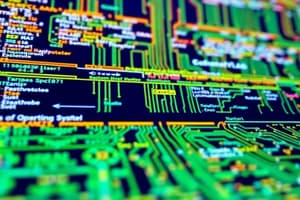Podcast
Questions and Answers
What is an Operating System?
What is an Operating System?
The primary software installed on a computer that manages all hardware and software.
Which of the following are goals of an Operating System? (Select all that apply)
Which of the following are goals of an Operating System? (Select all that apply)
- Make user problems harder to solve
- Make the system complex to use
- Use hardware efficiently (correct)
- Execute user programs (correct)
An OS is responsible for managing CPU time, memory, files, and devices.
An OS is responsible for managing CPU time, memory, files, and devices.
True (A)
What is process management in the context of an OS?
What is process management in the context of an OS?
What is Virtual Memory?
What is Virtual Memory?
What are the responsibilities of an OS in file management? (Select all that apply)
What are the responsibilities of an OS in file management? (Select all that apply)
What is the purpose of device drivers in an OS?
What is the purpose of device drivers in an OS?
The OS does not need to provide security and protection for user data.
The OS does not need to provide security and protection for user data.
Which activity does an OS perform to optimize system performance? (Select all that apply)
Which activity does an OS perform to optimize system performance? (Select all that apply)
What is job accounting in the context of an OS?
What is job accounting in the context of an OS?
Flashcards are hidden until you start studying
Study Notes
What is an Operating System?
- Operating System (OS) is the primary software managing computer hardware and software.
- Acts as an intermediary between users and hardware, ensuring efficient operation.
- Responsible for system software essential for booting and performing functions.
- Operates as a resource allocator, managing resources and resolving conflicts.
- Functions as a control program, regulating program execution to minimize errors.
Operating System Goals
- Facilitate execution of user programs, thereby simplifying problem-solving.
- Enhance convenience of computer use.
- Optimize utilization of computer hardware.
Functions of Operating System
Process Management
- Defines a process as a program currently in execution, requiring CPU time, memory, and I/O devices.
- Processes can be dependent (sharing resources) or independent (avoiding memory overlap).
- Prioritization of processes allows critical tasks to execute first for efficiency.
Memory Management
- Memory consists of a vast array of addressable words or bytes, serving as a quick-access data repository.
- Main memory is volatile, meaning data is lost when powered off.
- Virtual memory utilizes a portion of permanent storage (like hard disks) as additional memory.
- The OS tracks memory allocation, identifying which parts are in use and by which processes.
File Management
- A file is a collection of related information created and stored in a defined format.
- File systems manage data encoding, storage, and retrieval from devices such as hard disks.
- The OS handles activities such as creating and deleting files and directories, manipulating file primitives, and backing up files on nonvolatile media.
Device Management (I/O Management)
- Device controllers connect the CPU to actual devices, ensuring smooth operation.
- Device drivers are OS components that facilitate communication between the CPU and device controllers.
- An interrupt controller prioritizes and manages interrupt requests, ensuring orderly access to devices.
- The OS assigns device responsibilities, manages access duration, and efficiently allocates and deallocates devices.
Security and Protection
- OS employs password protection to safeguard user data against unauthorized access.
- Implements access rights to files and directories, enabling information control in multiuser systems.
- Ensures concurrent processes do not interfere, maintaining system integrity.
Control Over System Performance
- OS monitors delays between device requests and system responses to evaluate performance.
- Oversees overall system health, optimizing function and responsiveness.
- Performance tracking facilitates troubleshooting and enhances operational efficiency.
Job Accounting
- Maintains records of time and resources used by different processes for tracking and management purposes.
Studying That Suits You
Use AI to generate personalized quizzes and flashcards to suit your learning preferences.




